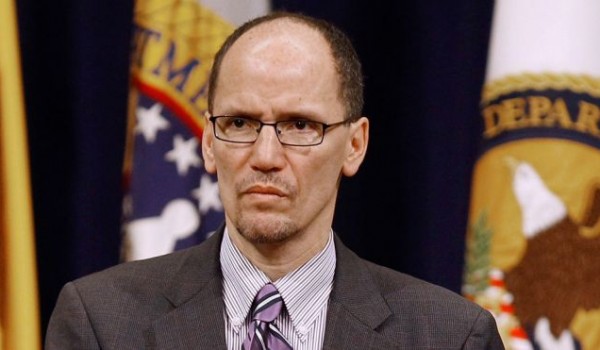Labor Department’s proposed persuader rules will apply to more than most realize
Thanks to Mitch McConnell and his fellow Senate Republicans giving in to Harry Reid’s “nuclear” threat last month, America’s employers–large and small–and their consultants and attorneys will be shocked when Obama’s new labor secretary Thomas Perez releases the Department of Labor’s proposed “persuader” regulations in November.
Originally included as part of the 1959 Labor-Management Reporting and Disclosure Act during the crackdown on corrupt unions, the LMRDA currently requires employers to disclose the fees paid to advisors (either attorneys or consultants) who “persuade” employees in the exercise of their Section Seven Rights under the National Labor Relations Act.
Under the threat of criminal penalty for willful failure to file the required reports, the interpretation of this provision has always been applied to those companies who hire consultants who meet directly with employees regarding union activity.
In 2011, however, Barack Obama’s former labor secretary, Hilda Solis, proposed to greatly expand the definition of “persuader activity.” The proposal was met with nearly 9,000 public comments–including a blistering rebuke from the usually-politically neutral American Bar Association.
As written, the labor department’s 160-page proposal broadly expanded what constitutes “persuading” employees.
An employer and consultant each must file a report concerning an agreement or arrangement pursuant to which the consultant engages in activities that have as a direct or indirect object to, explicitly or implicitly, influence the decisions of employees with respect to forming, joining or assisting a union, collective bargaining, or any protected concerted activity (such as a strike) in the workplace. Specific examples of persuader activities that, either alone or in combination, would trigger the reporting requirements include but are not limited to: drafting, revising, or providing a persuader speech, written material, website content, an audiovisual or multimedia presentation, or other material or communication of any sort, to an employer for presentation, dissemination, or distribution to employees, directly or indirectly; planning or conducting individual or group meetings designed to persuade employees; developing or administering employee attitude surveys concerning union awareness, sympathy, or proneness; training supervisors or employer representatives to conduct individual or group meetings designed to persuade employees; coordinating or directing the activities of supervisors or employer representatives to engage in the persuasion of employees; establishing or facilitating employee committees; developing employer personnel policies or practices designed to persuade employees; deciding which employees to target for persuader activity or disciplinary action; and coordinating the timing and sequencing of persuader tactics and strategies. [pages 68 & 69].
Given Barack Obama’s appointees at the NLRB giving greater emphasis on the “concerted activity” portion of the National Labor Relations Act’s Section Seven rights for non-union employees, the DOL’s proposal will, most assuredly cast a wider net on persons who do not advise on union issues.
A few examples of those who will likely be required to file under the DOL’s persuader proposal include:
- Human Resources consultants (or attorneys) who assist in the development of employee handbooks
- Compensation and benefit consultants who design compensation and/or benefit plans for companies
- Safety consultants who help companies design safety committees or other safety-related policies
Bearing in mind that the National Labor Relations Act covers nearly every union and non-union private-sector workplace (excluding airlines and railroads) with two or more employees, even if employers and their consultants (or attorneys) are not contemplating a union, they may be required to file reports with the Department of Labor as “implicit” activities could “indirectly” affect (or persuade) employees in the exercise of their Section Seven rights.
To give a ludicrous, but very plausible, example: If an employer retains a consultant to meet with employees and find out what kind of coffee they prefer in the employee break room, that activity would likely be deemed “persuader activity” under the DOL’s proposal–both the employer and the consultant would be branded criminals if they willfully did not file reports with the Department of Labor. [Happy employees are less likely to unionize, after all.]
As noted above, the DOL will be releasing the new rules in November.
No one is certain at this point what the new rules will state exactly since the regulations were held up due to the 2012 campaign season, Hilda Solis’ subsequent surprise resignation, and the Republican Senators refusal to confirm Thomas Perez and other controversial nominees.
Unfortunately, however, the 2011 proposal places more companies and their consultants (and attorneys) at risk than most realize and one of the side effects of Senate Republicans’ will be to cause many unsuspecting employers, consultants and attorneys to inadvertently become criminals for activities that create better workplaces.
__________________________
“Truth isn’t mean. It’s truth.”
Andrew Breitbart (1969-2012)





